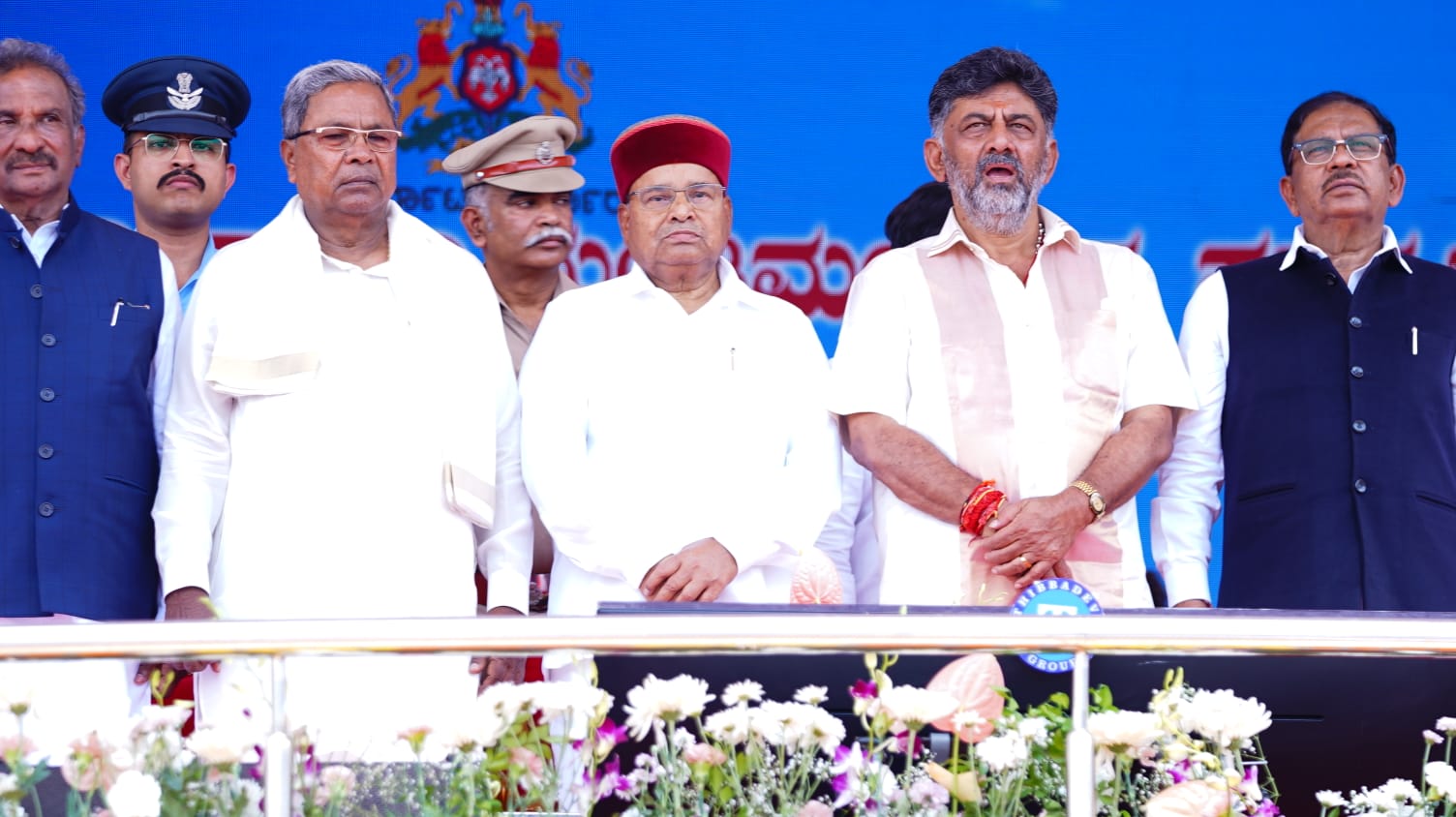The government will introduce a bill in this regard in the upcoming legislature session, which starts on 3 July.

Governor of Karnataka Thawar Chand Gehlot with Siddaramaiah and DK Shivakumar. (Supplied)
The Karnataka Cabinet on Thursday, 15 June, decided to repeal the changes made in the so-called anti-conversion law by the previous BJP government.
The government will introduce a Bill in this regard in the upcoming legislature session, which starts on 3 July.
“The Cabinet discussed the anti-conversion Bill. We have approved the Bill to repeal the changes brought in by them (the BJP government) in 2022. It will be tabled during the session starting from 3 July,” Law and Parliamentary Affairs Minister HK Patil told reporters after the Cabinet meeting.
The Bill was first tabled in the Karnataka Legislative Assembly in December 2021. While the BJP ensured the Bill’s passage in the Legislative Assembly with a voice vote amid protests by the Congress and the JD(S), the Bill did not go through in the Upper House.
In May last year, the Karnataka Cabinet converted the Bill into an ordinance to bring a law penalising alleged religious conversions. The Bill was tabled in the Legislative Council on 15 September, 2022.
The Bill was passed on 15 September, 2022, with minor amendments five days after the Upper House — the Legislative Council — passed it.
After getting assent from the Governor, the Bill was enacted on 30 September, 2022.
Among the contentious points introduced in the law — formally called the Karnataka Right to Freedom of Religion Act — were that interfaith marriages involving religious conversion would be null and void.
Free education, the promise of marriage, and jobs would be deemed “allurement” for religious conversion.
Most worryingly, any person — not necessarily family or friend — could make allegations of “unlawful” religious conversions and land others in jail.
It proposed imprisonment from three to five years with a fine of ₹25,000, while for violation of provisions with respect to minors, women, SC/ST, the offenders would face imprisonment from three to 10 years and a fine of not less than ₹50,000.
The Act also had provisions for the accused to pay up to ₹5 lakh as compensation to those who were made to convert, and with regards to cases of mass conversion, there would be a 3- to 10-year jail term and a fine of up to ₹1 lakh.
It also stated that any marriage that happened for the sole purpose of unlawful conversion or vice-versa by the man of one religion with the woman of another, either by converting himself before or after marriage or by converting the woman before or after marriage, would be declared null and void by the family court.
The offence under the Act was non-bailable and cognisable.
The BJP reacted sharply to the Congress government’s decision to repeal the anti-conversion law brought in by its regime in Karnataka, and dubbed the party as the “new Muslim League”
Is this “Mohabbat Ki Dukaan” Mr @RahulGandhi ?” asked senior BJP leader and former Union minister Basanagouda R Patil (Yatnal) on Twitter.
ಮತಾಂತರ ನಿಷೇಧ ಕಾಯ್ದೆಯನ್ನು ಹಿಂಪಡೆಯುವುದರ ಮೂಲಕ @siddaramaiah ನವರ ಹಿಂದೂ ವಿರೋಧಿ ನಿಲುವನ್ನು ಮತ್ತೆ ಕಾಂಗ್ರೆಸ್ ಸರ್ಕಾರ ಅನುಸರಿಸಿದೆ.
ಆಮಿಷದ ಮತಾಂತರವನ್ನು ನಿರ್ಬಂಧಿಸುವ ಮತಾಂತರ ನಿಷೇಧ ಕಾಯ್ದೆಯನ್ನು ಹಿಂಪಡೆಯುವುದು "ಹಿಂದೂ" ಸಮಾಜವನ್ನು ಮತಾಂತರಗೊಳಿಸುವವರಿಗೆ ಬೆಂಬಲ ನೀಡಿದಂತೆ ಅಲ್ಲವೇ?
ಯಾವ "ಮಾಫಿಯಾ" ಈ ಮತಾಂತರ ನಿಷೇಧ…
— Basanagouda R Patil (Yatnal) (ಮೋದಿಯವರ ಕುಟುಂಬ) (@BasanagoudaBJP) June 15, 2023
Chief Minister Siddaramaiah’s “anti-Hindu agenda” is exposed, he said. Do you want Hindus to be wiped out? Conversion Mafia has influenced Siddaramaiah and his Cabinet to withdraw “Anti Conversion Law” which was introduced by BJP, he added.
BJP National General Secretary CT Ravi alleged that the “conversion mafia” in Karnataka had ensured that the “anti-Hindu Congress” repeals the anti-conversion law brought in by the BJP government.
He added: “The Congress is the new Muslim League and it will go to any extent to hurt Hindus.”
The Conversion Mafia in Karnataka ensures that the #AntiHinduCONgress repeals the anti-conversion law brought in by the @BJP4Karnataka government is repealed by the CM @siddaramaiah government.
After failing to provide people friendly Bhagyas, the incompetent and communal… pic.twitter.com/4VuD9OaCwI
— C T Ravi 🇮🇳 ಸಿ ಟಿ ರವಿ (Modi Ka Parivar) (@CTRavi_BJP) June 15, 2023
A Muslim man named Syed Mueen — a 24-year-old resident of BK Nagar in Bengaluru, who runs a chicken shop in Yeshwanthpura in the city — was the first person to be slapped with a case under the law.
He was arrested on 8 October, 2022, because of his marriage to a 19-year-old Hindu girl, who accompanied him to the Penukonda district of Andhra Pradesh and converted to Islam there.
After they got married, they returned to Bengaluru the following week.
The Karnataka police booked him under the “precondition before a wedding” section under the new act.
The people belonging to the minorities, especially Christians, had raised concerns against the law saying that the bill was introduced to target them.
“After the introduction of the anti-conversion bill and the Assembly election round the corner, we fear that there will be attacks on churches, particularly during the midnight services, and on carol singers who go house to house singing glory to the Lord,” JA Kanthraj, spokesperson of the Archdiocese of Bangalore, told South First, back then.
Several people were arrested for involvement in religious conversions in the state since the Karnataka Protection of Right to Freedom of Religion Act of 2022 came into effect.
(With PTI inputs)

May 12, 2024

May 12, 2024

May 12, 2024

May 11, 2024

May 11, 2024

May 11, 2024